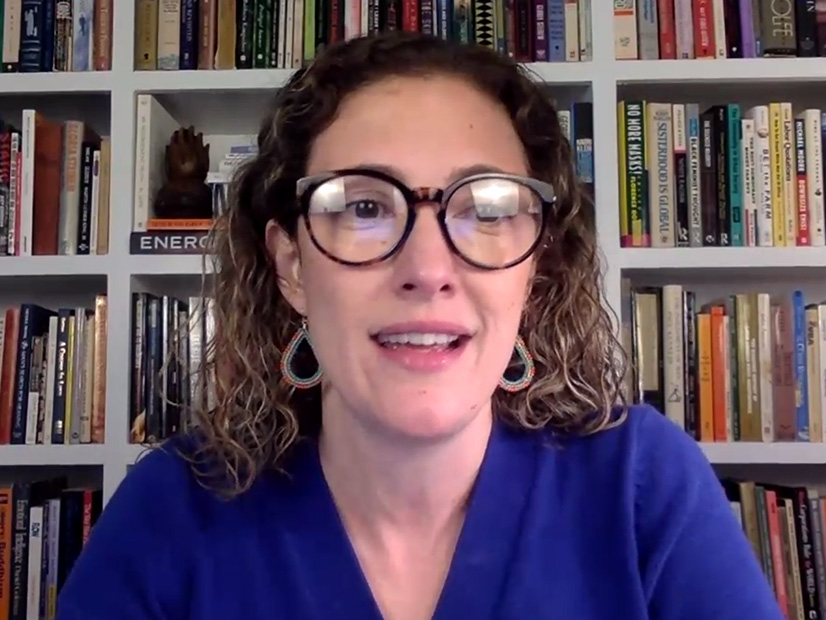The New York Climate Action Council’s Power Generation Advisory Panel will recommend that the full council adopt a moratorium on building new gas-fired power plants and related infrastructure — with the caveat that it did not achieve consensus on the idea. (See “Public Input” in NY Power Panel Debates Gas Moratorium.)
The panel met Monday to review public comments and changes to its final scoping plan recommendations, which will be delivered to the CAC at its May 10 meeting. The CAC is charged with making recommendations to state regulators to meet emission’s targets but does not have the power to issue binding measures.
“We received a lot of feedback through both our email address for public comment, our voicemail, and through the five public information sessions that we held,” said Sarah Osgood, director of policy implementation at the state’s Department of Public Service, who chaired the meeting and was last month appointed executive director of the CAC. “The vast majority of the comments were from individuals, but we also did get some from environmental justice and environmental groups, as well as utilities and a variety of different organizations.”
Public comments at a panel session in March supported stopping construction of new gas-fired power plants, closing old peakers, and increasing the use of energy storage and other new technologies to cut emissions and help achieve a net-zero grid. (See Cut Peakers, Boost Storage, NY Climate Council Hears.)
The state’s Climate Leadership and Community Protection Act (CLCPA) requires 40% decreases of methane and other greenhouse gases by 2030 and 85% cuts by mid-century. It also requires the grid to run on 70% renewables by 2030 and be net-zero by 2040.
The panel agreed Monday to a few changes to its draft recommendations, including to technology and market solutions, and increasing resources to ensure the buildout of distributed energy resources. The recommendations will now incorporate advanced fuels, distinguish green hydrogen from combustion of hydrogen, and urge a study on untapped renewable energy and storage potential.
The market solutions will include a strengthened statement that NYISO buyer-side mitigation rules should not be applied to CLCPA resources. The panel will urge state advocacy at NYISO and FERC to align markets and planning processes with CLCPA goals, as well as earnings adjustment mechanisms for utilities to speed decarbonization efforts, Osgood said.
Panel Concurrence
“We particularly put an emphasis on developing dispatchable technology solutions as they emerge,” William Acker, executive director of the New York Battery and Energy Storage Consortium (NY-BEST), said, referring to efforts by the utilities to procure long-duration storage. “I do believe we have a very good set of recommendations, and I’m fully supportive.”
Lisa Dix, New York representative for the Sierra Club Beyond Coal Campaign, referred to the panel members’ differing views on a moratorium on building new gas-powered generators and encouraged the utility group to look at the recommendations being put forth to the CAC in terms of a refinement of ideas on dispatchable resources.
“If the utilities really want to play a role in decarbonizing the electric sector fully… really leaning in and figuring out how they can work with the state to replace fossil fuel plants and units over time with creative financing mechanisms that would be able to bundle non-emitting resources would be a great collaborative effort,” Dix said.
NYISO Executive Vice President Emilie Nelson said the diversity of the panel strengthened the effort, and that a strong aspect of the recommendations is the iterative nature of some of the planning processes implemented for consideration by the CAC.
“Given the length of this implementation, we’re considering how to transform not only the electric sector, but the balance of the economy over the next two decades and beyond,” Nelson said. “Remaining engaged is going to be necessary as we make adjustments as we go ahead and make sure that all interests are balanced.”
John Reese, senior vice president of Eastern Generation, said the panel had arrived at “the core solution” of building upon the peaker regulations and the approach taken there of reviewing proposals and coordinating reliability to ensure that the state gets to zero carbon while maintaining reliability and the New York economy.
Kit Kennedy, director of energy and transportation for the Natural Resources Defense Council, lauded the collective “smart planning” of the panel to meet the CLCPA goals and said that “the addition of energy efficiency and demand response recommendations was perhaps the final piece in the puzzle,” and that “flexible resources will be really important” to achieving the state’s climate targets.
Betta Broad, outreach director at New Yorkers for Clean Power, said that the interdisciplinary nature of the group resulted in strong recommendations. “I’m delighted that we were able to expand the scope of the methane leakage section, in particular, and address the need to decommission the entire gas system.”








